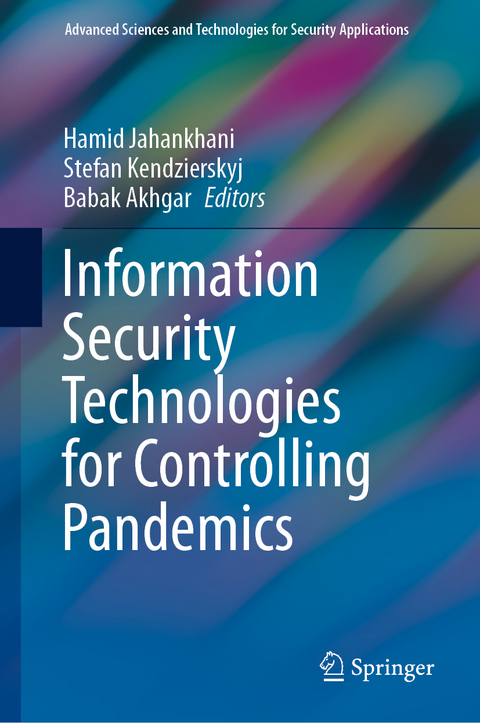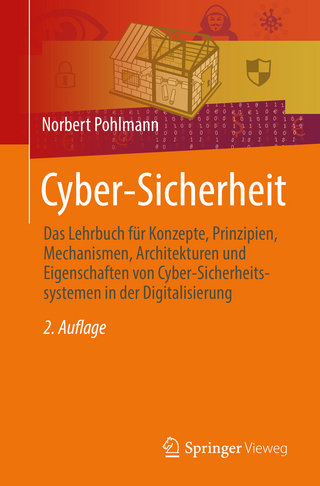
Information Security Technologies for Controlling Pandemics
Springer International Publishing (Verlag)
978-3-030-72119-0 (ISBN)
The year 2020 and the COVID-19 pandemic marked a huge change globally, both in working and home environments. They posed major challenges for organisations around the world, which were forced to use technological tools to help employees work remotely, while in self-isolation and/or total lockdown. Though the positive outcomes of using these technologies are clear, doing so also comes with its fair share of potential issues, including risks regarding data and its use, such as privacy, transparency, exploitation and ownership.
COVID-19 also led to a certain amount of paranoia, and the widespread uncertainty and fear of change represented a golden opportunity for threat actors. This book discusses and explains innovative technologies such as blockchain and methods to defend from Advanced Persistent Threats (APTs), some of the key legal and ethical data challenges to data privacy and security presented by the COVID-19 pandemic, and their potential consequences. It then turns to improved decision making in cyber security, also known as cyber situational awareness, by analysing security events and comparing data mining techniques, specifically classification techniques, when applied to cyber security data.
In addition, the book illustrates the importance of cyber security, particularly information integrity and surveillance, in dealing with an on-going, infectious crisis. Aspects addressed range from the spread of misinformation, which can lead people to actively work against measures designed to ensure public safety and minimise the spread of the virus, to concerns over the approaches taken to monitor, track, trace and isolate infectious cases through the use of technology. In closing, the book considers the legal, social and ethical cyber and information security implications of the pandemic and responses to it from the perspectives of confidentiality, integrity and availability.
lt;p>Prof. Hamid Jahankhani gained his Ph.D. from the Queen Mary College, University of London. In 1999, he moved to the University of East London (UEL) to become the first Professor of Information Security and Cyber Criminology at the university in 2010. Over the last 15 years, Hamid has also been involved in developing new and innovative programmes and introducing "block mode" delivery approach at UEL, including M.Sc. in Information Security and Computer Forensics, and Professional Doctorate in Information Security.
Hamid's principal research area for a number of years has been in the field of cyber security, information security and digital forensics. In partnership with the key industrial sectors, he has examined and established several innovative research projects that are of direct relevance to the needs of UK and European information security, digital forensics industries, Critical National Infrastructure, and law enforcement agencies. Hamid havehas planned, proposed, and managed several collaborative projects, and secured a substantial research income of up to £6m.
Professor Jahankhani is Editor-in-Chief of the International Journal of Electronic Security and Digital Forensics, and International Journal of Electronic Democracy, and General Chair of the annual International Conference on Global Security, Safety and Sustainability (ICGS3). Hamid has edited and contributed to over 15 books and has over 150 conference and journal publications together with various BBC radio interviews. Hamid has supervised to completion 13 Ph.D. and professional doctorate degree students and overseen 67 Ph.D. students progressing. In summer 2017, Hamid was trained as the GCHQ "cyberist" to train the next generation of cyber security experts through GCHQ CyberFirst initiative.
Stefan Kendzierskyj is a prominent and valued commercial director with experience built over the years whilst positioned at a number of leading-edge technology companies, covering domains in digital transformation, cybersecurity technologies and other frameworks. Stefan consults and recommends strategic approaches for businesses to undertake critical decisions around these domains and implement innovative solutions to reach new markets. His understanding of validating the business reasons/impact, and not only technology, makes the overall end-to-end solution assessment highly successful. Stefan possesses a strong technology background and attained a distinction with a MSC in Cybersecurity from an NCSC/GCHQ accredited UK University and also engaged in ongoing research in a number of key areas such as blockchain, IoT, digital twins, critical national infrastructure, social media analytics and cyberwarfare. Stefan is an accomplished published author with recent works with Springer Nature of 'Blockchain and Clinical Trial' and Cyber Defence in the Age of AI and a number of contributed Chapters to other published works, journal articles and conference papers. He also provides publisher services for the UK Disaster Victim Identification team and Interpol in the form of process tools to aid in the investigation work for mass fatalities. Stefan is a regular speaker at cybersecurity events, digital transformation and thought leadership conferences and is a Fellow of the Royal Society for the encouragement of Arts, Manufactures and Commerce (RSA) and a Member of the Institution of Engineering and Technology (IET). He is also a member of IEEE working groups for AI ethical, privacy and transparency for autonomous and intelligent systems.
Babak Akghar is Professor of Informatics and Director of CENTRIC at Sheffield Hallam University and Fellow of the British Computer Society. He graduated from Sheffield Hallam University in Software Engineering, and later gained considerable commercial experience as Strategy Analyst and Methodology Director fo
1. Usability of the CBEST Framework for Protection of Supervisory Control and Acquisition Data systems (SCADA) in the Energy Sector.- 2. Blockchain Capabilities in Defending Advanced Persistent Threats Using Correlation Technique and Hidden Markov Models (HMM).- 3. A matter of life and death: how the Covid-19 pandemic threw the spotlight on digital financial exclusion in the UK.- 4. Data Privacy and Security: Some Legal and Ethical Challenges.- 5. Combating Human Trafficking: An Analysis of International and Domestic Legislations.- 6. An investigation into the Impact Covid-19 has had on the Cyber Threat Landscape and Remote Working for UK organizations.
| Erscheinungsdatum | 02.08.2021 |
|---|---|
| Reihe/Serie | Advanced Sciences and Technologies for Security Applications |
| Zusatzinfo | VI, 461 p. 151 illus., 130 illus. in color. |
| Verlagsort | Cham |
| Sprache | englisch |
| Maße | 155 x 235 mm |
| Gewicht | 859 g |
| Themenwelt | Informatik ► Netzwerke ► Sicherheit / Firewall |
| Schlagworte | Artificial Intelligence • Attack vectors • Big Data • Covid-19 • critical national infrastructure • cyber defence • Data Ownership • insider threat • Pandemic Cyber Defence |
| ISBN-10 | 3-030-72119-1 / 3030721191 |
| ISBN-13 | 978-3-030-72119-0 / 9783030721190 |
| Zustand | Neuware |
| Haben Sie eine Frage zum Produkt? |
aus dem Bereich


